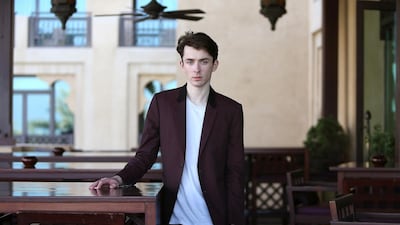As the awards season heats up in Hollywood, The Imitation Game is one of the clear front runners.
It tells the story of Alan Turing, the British scientist who invented two world-changing inventions. One of them was, in essence, the template for all modern-day computers.
The other was a machine that cracked the top-secret Enigma code used by the Germans during the Second World War. It has been estimated that the conflict was shortened by as much as four years thanks to the intelligence gained as a result of Turing’s work, which helped to covertly tip the balance of key battles in favour of the Allies.
Winston Churchill hailed Turing as a war hero, but in 1952 he was prosecuted for his sexual orientation. He committed suicide two years later.
Such a true-life story was always likely to appeal to awards juries, but thanks to an incredible lead performance by Benedict Cumberbatch, the British star of the BBC TV show Sherlock, and assured direction from Norway's Morten Tyldum, the film has surpassed the already high expectations.
With five Golden Globe nominations, including Best Picture and nods for Cumberbatch and his co-star Keira Knightley, The Imitation Game is widely tipped to be among the most-honoured success stories when this year's Oscar nominations are announced on January 15.
The Imitation Game goes on general release on Thursday, January 8, but some lucky viewers got to see it last month at the Dubai International Film Festival.
Co-star Matthew Beard, who plays Peter Hilton, one of Turing’s fellow codebreakers – was in town for that red-carpet regional premiere, after which we sat down for a chat with the 25-year-old British actor.
How much did you know about Alan Turing going into the project?
I’d heard his name and had heard a little bit about Enigma, but I had no idea what was going on at Bletchley Park, where the code was cracked. And I had never heard about what happened to him afterwards. That’s the most shocking part for me. We [the British] were celebrating him as a war hero, but there was no mention – presumably out of embarrassment – about what did happen to him afterwards.
Did you feel the weight of history during filming, a sense of responsibility to get the story told right?
Almost all the characters in the film are based on real people, with real names, and that’s always tricky. On the one hand it’s great, you’ve been given your backstory, all the hard work has been done for you.On the other hand, you also have this responsibility of staying truthful to that, in an environment where time is money, we’ve got a story to tell, and [there is a need to] keep entertaining. The reality of codebreaking is quite a tedious process and an eight-hour film where we watch someone work a puzzle out wouldn’t have been that entertaining.
How much did you find out about the real version of the character you play?
There was a real Peter Hilton. Without giving too much away, what happens to him in the film didn’t happen in real life.
Sadly, he died in 2010, but I did meet lots of people who knew him, but not until after we’d shot it, just to avoid ... that, because I knew certain liberties had been taken with his character. It wasn’t the Peter Hilton story, it was the Alan Turing story, and I had to try to remember that.
I understand you’re something of a genius yourself.
I wouldn’t go that far.
Well, let’s just say you’re the first actor I’ve interviewed who has their GCSE results on Wikipedia – 11 A*s.
My housemates have this theory that I put this on there myself and I can assure you that I didn’t, because it leads to situations such as this where people go “I found out you’re smart” and give me a quiz, and I know nothing. I don’t know who put that on there – probably my mum or my school. But yes, I did get good GCSE results.
How was Benedict to work with? He seems ... intense.
But he’s not intense – he’s very focused and concentrated, and he would never do anything that would compromise the character. But in between takes, he’s just him and is lovely, welcoming and friendly – and will sit and do crosswords with the rest of the cast.
Hold on, so you all did crosswords together in real life?
Well we tried to do some code-cracking ourselves, but we were terrible. It took us four days collectively to do a crossword. Meanwhile, were doing scenes where we’re supposedly geniuses.
And how was Keira Knightley to work with?
She’s wonderful and she’s so good in the film. Her character is such a difficult one to get the balance right and, in my opinion, she completely nails it. She was really funny and really cool, we all used to just hang out in her trailer between takes. She was definitely one of the team.
It’s been a good year for you, with both The Imitation Game and The Riot Club, a thriller about a group of toffs. What’s your next dream role?
I think there will eventually be a realistic James Bond – ie, me. Because Daniel Craig, yeah, looks great and stuff, but no MI6 agent really looks like that – they’re actually skinny desk workers who are geniuses, more like a Bletchley Park kind of guy. So I’m just waiting for the realistic James Bond to happen – I’m here, I’m ready when the call comes.
rgarratt@thenational.ae

